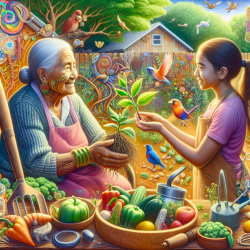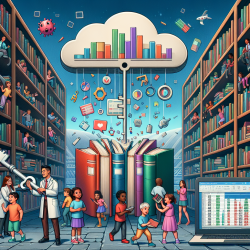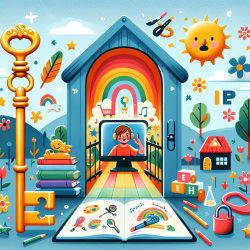Introduction
As practitioners in the field of speech-language pathology, we often seek innovative ways to support children's development and wellbeing. One intriguing approach comes from the research article "Growing Intergenerational Resilience for Indigenous Food Sovereignty Through Home Gardening." This study highlights how home gardening can foster resilience across generations, particularly within Indigenous communities. By understanding and implementing these findings, practitioners can enhance their skills and contribute to better outcomes for children and families.
The Power of Intergenerational Resilience
Intergenerational resilience refers to the ability of families to transmit resilience across generations through shared practices, knowledge, and relationships. The study conducted by Budowle, Arthur, and Porter (2019) on the Wind River Reservation in Wyoming demonstrates how home gardening can serve as a culturally specific mechanism for fostering resilience among Eastern Shoshone and Northern Arapaho families.
Key Findings and Implications for Practitioners
- Family Togetherness: Gardening brings families together, strengthening relationships and creating a sense of accomplishment. Practitioners can encourage families to engage in gardening activities as a means to foster communication and collaboration.
- Teaching and Learning: Gardens provide a platform for teaching children about responsibility, self-reliance, and healthy eating. Practitioners can integrate gardening into therapy sessions to promote these skills in a hands-on, engaging manner.
- Reclaiming Knowledge: Many families expressed a desire to reclaim lost gardening skills and traditions. Practitioners can support this by facilitating workshops or connecting families with community resources that offer gardening education.
- Addressing Historical Trauma: The study highlights the impact of historical trauma on gardening practices. Practitioners should be sensitive to these issues and work collaboratively with families to address and heal from past traumas.
- Future Orientation: Families see gardening as a way to prepare children for the future. Practitioners can use this future-oriented mindset to set goals and develop plans that align with the family's vision for their children's wellbeing.
Encouraging Further Research
While the findings of this study are promising, further research is needed to explore how intergenerational resilience can be fostered in different cultural contexts and through various activities. Practitioners are encouraged to conduct their own research or collaborate with researchers to expand our understanding of these concepts and their applications in speech-language pathology.
Conclusion
By integrating the principles of intergenerational resilience and Indigenous food sovereignty into their practice, speech-language pathologists can create meaningful and lasting impacts on the families they serve. Gardening is more than just a hobby; it's a powerful tool for fostering resilience, healing, and growth across generations.
To read the original research paper, please follow this link: Growing intergenerational resilience for Indigenous food sovereignty through home gardening.










